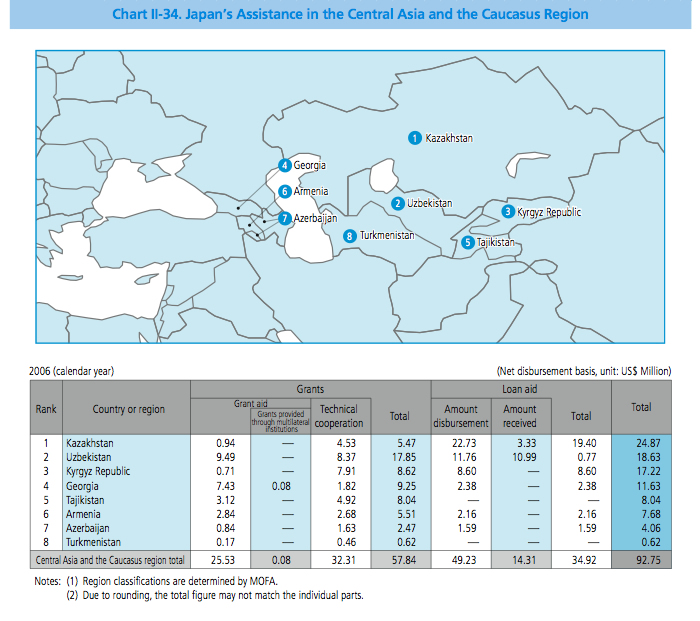Japan's Official Development Assistance White Paper 2007
Main Text > Part II ODA RECORD FOR FY2006 > Chapter 2 Details about Japan's Official Development Assistance > Section 3. Assistance for Each Region > 3. Central Asia and the Caucasus
3. Central Asia and the Caucasus
< Record for FY2006 >
Japan's bilateral assistance to Central Asia and the Caucasus in 2006 was approximately US$92.75 million, 1.2% of total bilateral ODA.
< Features of Central Asia and the Caucasus >
Under the new international circumstances that have emerged since the collapse of the former Soviet Union, Central Asia and the Caucasus region have taken on geopolitical importance by dint of their proximity to Russia, China, South Asia and the Middle East. The region is also extremely important to Japan in its diplomacy on natural resources since this region produces natural resources including oil, natural gas, uranium and rare metals. In view of this importance, and being conscious of the expanding regional scope of its diplomacy, Japan acknowledges that for the long-term stability and sustained development of the region, it is important to build a system based on shared universal values (human rights, democracy, market economies, and rule of law).
< Japan's Efforts >
● Central Asia
In order to facilitate the transition from planned economies to market economies, Japan is providing assistance focused on establishing legal institutions for establishing the rule of law, human resources development for shifting to a market-based economy, and infrastructure development for promoting economic development. It is especially vital for the countries of this region to receive assistance in "software" such as human resources development and institution building. Human Resources Development Centers (Japan Centers) have been established in Uzbekistan, Kazakhstan, and the Kyrgyzstan as bases for human resource-development assistance. Experts are dispatched to these centers from Japan to offer business courses as well as Japanese language lessons so as to share Japan's experiences with them, and they contribute to developing human resources that can respond to the introduction of the market economy in the region. Japan also accepts at its own expense exchange students from Uzbekistan and Kyrgyzstan, particularly young officials, who will play key roles in future nation-building. Japan also implements technical cooperation for developing IT engineers in Kyrgyzstan. With respect to assistance for building legal institutions, Japan is providing technical cooperation for improving civil codes and administrative laws for annotating bankruptcy law and corporate activity expansion in Uzbekistan. With respect to infrastructure development, Japan has heretofore assisted in the development of roads, airports, and railroads. Besides, in order to promote wider regional cooperation encompassing Central Asia and the region to the south, Japan places emphasis on the development of infrastructure relating to the so-called Southern Route, a road linking Central Asia to the Arabian Sea via Afghanistan. It was exemplified in Japan's assistance to develop a road in Tajikistan linking it with Afghanistan in FY2006.
● The Caucasus Region
One of the largest undeveloped oil fields in the world is located on the coast of the Caspian Sea in Azerbaijan, and the route for the oil pipeline between oil fields and the Mediterranean Sea goes through the southern Caucasus region. Therefore, the stable economic development in this region is important for international energy security. In the energy sector, Japan extended cooperation via loan aid for the construction of thermal power plants in March (Armenia) and May (Azerbaijan) 2005, providing assistance for the alleviation of the serious shortages in the supply of electric power expected in the future. At the Georgia Donors' Conference (June 2004, Brussels), Japan announced its continued assistance for Georgia which has developed democratization through the Rose Revolution of 2003. Japan provided assistance in March 2006 through financing for improving the economic structure. Moreover, creating employment for income improvement and improving public services have become common issues throughout the Caucasus. Japan offers assistance to these countries through efforts like dispatching experts and realizing training programs for promoting SMEs, and for the fields of health, medical care and water.
Chart II-34. Japan's Assistance in the Central Asia and the Caucasus Region

< Recent Trends >
In June 2006, Japan and Central Asian countries organized the 2nd Foreign Ministers Meeting for the "Central Asia plus Japan" Dialogue in Tokyo, a framework for dialogue and cooperation between the two, and adopted the Action Plan based on five pillars of cooperation: (1) political dialogue; (2) intraregional cooperation (e.g., measures against terrorism and drugs, environmental protection, energy/water, transportation, and trade and investment); (3) business promotion; (4) intellectual dialogue; and (5) cultural and human exchange (including tourism). In this plan, it was agreed to advance cooperation in these five priority areas and work toward this end using development assistance in various projects that are especially effective in promoting intra-regional cooperation. In August 2006, then Prime Minister Junichiro Koizumi visited Kazakhstan and Uzbekistan in Central Asia, as the first Prime Minister to visit these countries, and reaffirmed on the international stage Japan's intention to seek active involvement in this region.

Vice Minister for Foreign Affairs Masakatsu Koike (left) receiving a courtesy call from Deputy Foreign Minister of Armenia Armen Bayburtian


 Next Page
Next Page